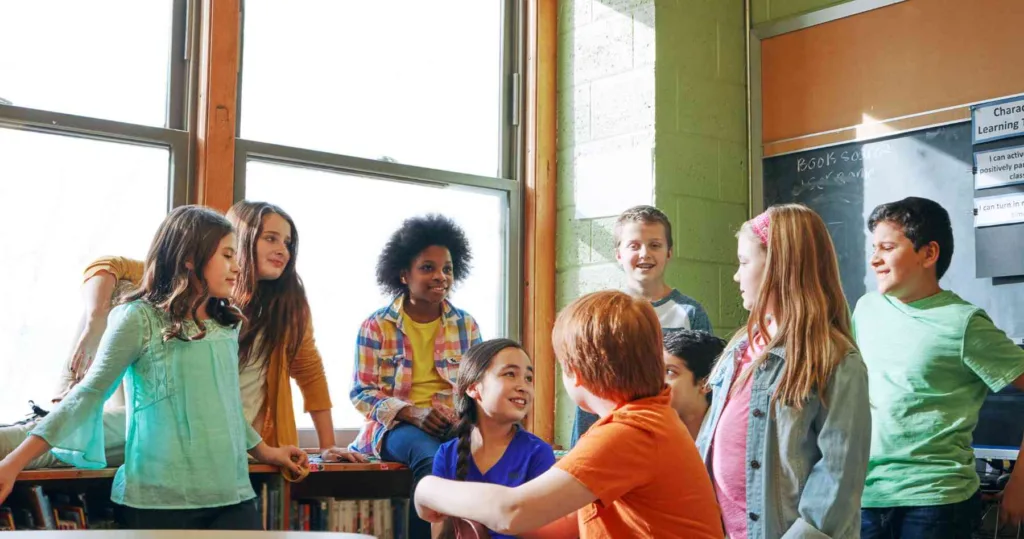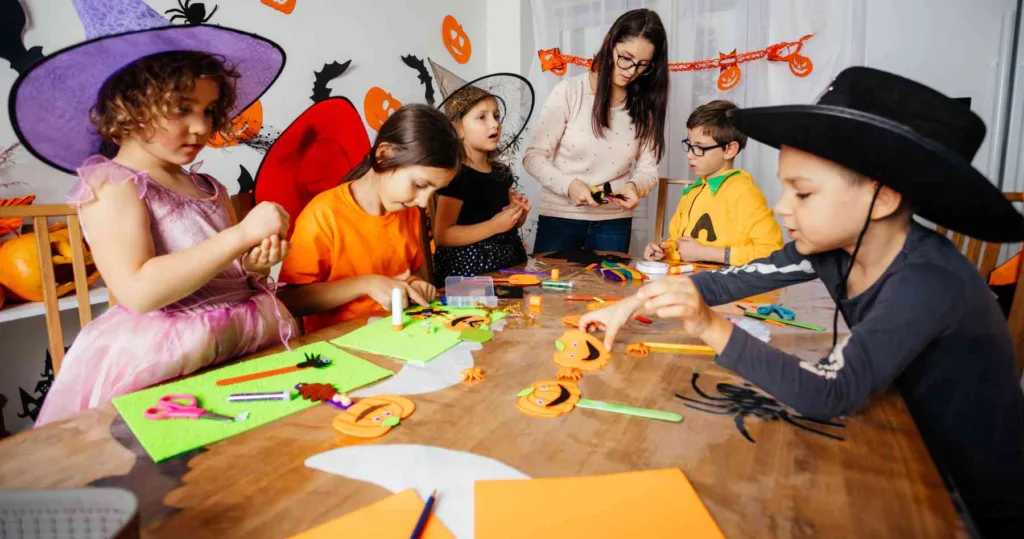Fostering Social Skills in Pre-Primary Kids
Nurturing Bright Futures: Fostering Social Skills in Pre-Primary Prodigies
In today’s rapidly evolving world, social skills are more important than ever. They form the foundation for successful interpersonal relationships, communication, and emotional intelligence. As parents and caregivers, it’s crucial to start nurturing these skills from a young age. This article explores the art of fostering social skills in pre-primary kids, offering valuable insights and practical tips to help your children flourish socially.

The Power of Early Social Development
Early social development plays a crucial role in shaping a child’s overall development and future success. During the early years of life, children begin to develop important social skills that lay the foundation for their ability to interact with others and navigate the complexities of the world around them. From building relationships to understanding emotions, early social development sets the stage for healthy emotional intelligence and effective communication skills.
The significance of early social development cannot be overstated. As children engage in interactions with caregivers, siblings, and peers, they learn valuable lessons about empathy, cooperation, and problem-solving. These experiences help them develop a sense of self-awareness and an understanding of their own emotions as well as those of others.
Why Early Childhood Matters
Early childhood is a critical period for the development of social skills. During this time, children are like sponges, absorbing information from their surroundings. By actively promoting positive social interactions, we can empower them to become confident and compassionate individuals.


Understanding Social Skills in Pre-Primary Kids
Before we delve into the strategies for fostering social skills, it’s essential to understand what these skills encompass. Social skills in pre-primary kids can be broadly categorized into:
Communication Skills: Effective verbal and non-verbal communication.
Emotional Regulation: The ability to understand and manage one’s emotions.
Empathy: The capacity to understand and share the feelings of others.
Cooperation: Working harmoniously with peers and adults.
Problem-Solving: Finding solutions to conflicts and challenges.
Communication Skills
Effective communication is the cornerstone of social interaction. In the context of pre-primary children, this involves both verbal and non-verbal communication. Verbal communication includes speaking and listening, while non-verbal communication encompasses body language, facial expressions, and gestures.
Understanding communication skills in pre-primary kids means recognizing that they are still developing their vocabulary and articulation. They may use simple sentences and rely heavily on non-verbal cues to express themselves. It’s important to encourage them to communicate their needs, thoughts, and feelings, while also teaching them to listen actively to others. By fostering these skills, children can convey their ideas, make friends, and navigate social situations more effectively.
Emotional Regulation
Emotional regulation refers to a child’s ability to recognize, understand, and manage their emotions. Pre-primary kids often experience a wide range of emotions but may struggle to express or control them. Understanding emotional regulation involves acknowledging that children at this age are still learning to identify their feelings and cope with them appropriately.
Parents and caregivers play a crucial role in helping children understand and manage their emotions. Teaching them to label their feelings, express themselves without tantrums, and find healthy ways to calm down when upset are vital aspects of emotional regulation. By fostering emotional intelligence, we empower children to handle social interactions with greater emotional stability.
Empathy
Empathy is the capacity to understand and share the feelings of others. In pre-primary kids, empathy is an emerging skill that begins with recognizing basic emotions in others, such as happiness, sadness, or frustration. Understanding empathy at this stage involves appreciating that children are just starting to grasp the concept of other people having feelings and experiences distinct from their own.
To nurture empathy, parents and caregivers can engage in conversations about feelings, read books that explore empathy, and encourage children to imagine how others might feel in various situations. While empathy may be in its early stages, fostering this trait helps children build stronger connections with peers and develop compassion.
Cooperation
Cooperation is the ability to work harmoniously with peers and adults. For pre-primary kids, cooperation starts with simple tasks like sharing toys, taking turns, and playing together. Understanding cooperation in this context means recognizing that children are learning to navigate social dynamics and group play.
Promoting cooperation involves creating opportunities for children to engage in group activities, such as group games or collaborative art projects. These experiences teach them the importance of teamwork, compromise, and respecting others’ ideas. As children grow, their ability to cooperate matures, laying a solid foundation for successful social interactions.
Problem-Solving
Problem-solving skills in pre-primary kids involve their ability to find solutions to conflicts and challenges they encounter during social interactions. It’s important to understand that children at this age are just beginning to develop these skills, and they may initially turn to adults for assistance.
Encouraging problem-solving means offering guidance while allowing children to think critically and explore solutions independently. Providing scenarios for them to navigate, such as resolving disagreements with peers or finding creative solutions to playtime dilemmas, helps strengthen their problem-solving abilities. These early experiences empower pre-primary kids to handle social challenges with increasing independence as they grow.
Understanding these components of social skills in pre-primary kids provides valuable insights for parents and caregivers. By recognizing where children are in their social development, we can tailor our guidance and support to help them thrive socially and emotionally.
Get In touch
Leave us a message
4 Claret Road, Table View, 7441
(021) 556 4146
office@applebeekids.com
Fostering Social Skills in Pre-Primary Kids
Fostering social skills in pre-primary kids is crucial for their overall development and future success. Early childhood is a critical period for shaping social-emotional competencies that will serve as a foundation for their interactions and relationships throughout life. By focusing on developing these essential skills at a young age, we can empower children to navigate the complexities of human interaction with confidence and empathy.
Creating a Supportive Environment
One of the most effective ways to foster social skills in pre-primary kids is by creating a supportive and nurturing environment at home and in educational settings. Children thrive in environments where they feel safe and encouraged to explore social interactions.
Encourage Playdates
Organizing playdates with peers provides children with opportunities to interact, share, and learn essential social skills. It allows them to practice turn-taking, sharing, and cooperation in a relaxed and fun setting.
Teach Emotional Intelligence
Emotional intelligence is a fundamental aspect of social development. Help your child recognize and understand their emotions and those of others. Encourage discussions about feelings and validate their emotional experiences.
Set a Positive Example
Children learn by observing adults. Model positive social behavior in your interactions with others. Demonstrate kindness, empathy, and effective communication in your daily interactions, as children often mimic the behaviors they see.
Foster Empathy
Empathy is a cornerstone of strong social skills. Encourage your child to consider the feelings of others and show kindness. Read books or watch shows that promote empathy and discuss the characters’ emotions together.
Effective Communication
Effective communication is crucial for social success. Teach your child how to express themselves clearly and listen actively. Encourage them to ask questions, share their thoughts, and actively engage in conversations with friends and family.
Manage Conflict
Conflict is a natural part of social interactions. Teach your child healthy ways to resolve conflicts and find compromises. Role-play scenarios to help them practice conflict resolution skills.
Group Activities
Engage your child in group activities like team sports or group projects to promote cooperation and teamwork. These activities provide opportunities for children to work together towards a common goal and learn the value of collaboration.
Reward Positive Behavior
Positive reinforcement can be a powerful tool for nurturing social skills. Praise and reward your child when they exhibit positive social behaviors. Celebrate their accomplishments, no matter how small, to boost their confidence.

Newsletter
I am text block. Click edit button to change this text. Lorem ipsum dolor sit amet, consectetur adipiscing elit.
Fostering social skills in pre-primary kids is a rewarding journey that equips them with vital life skills. By creating a supportive environment, teaching emotional intelligence, and providing ample opportunities for social interaction, you can set your child on the path to becoming socially confident and empathetic individuals. Remember, the early years are the building blocks for a lifetime of healthy relationships and successful interactions.
